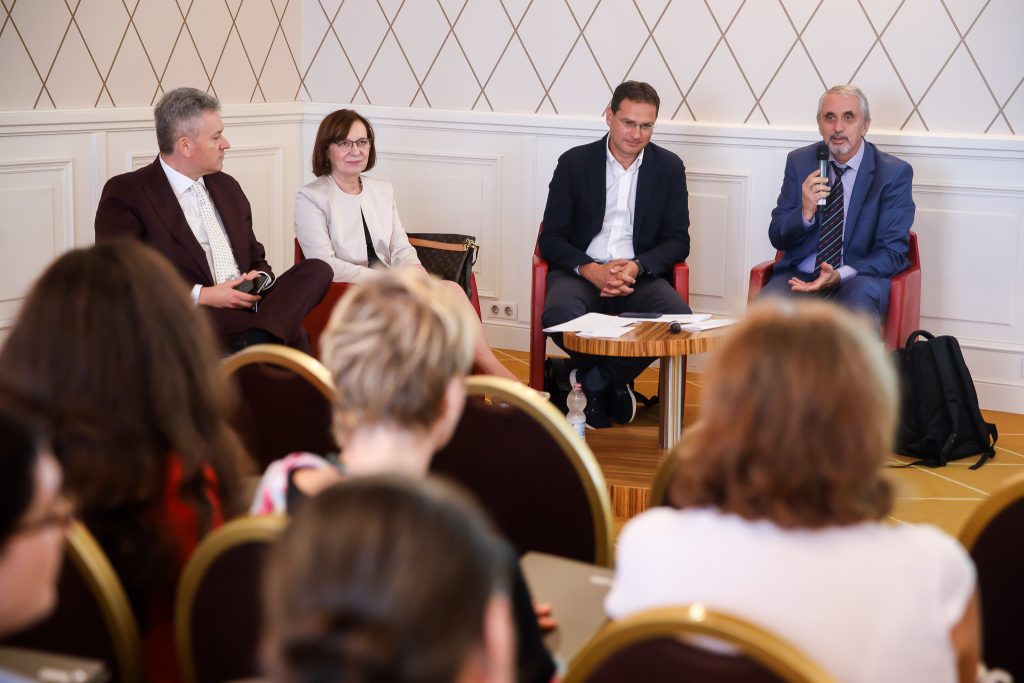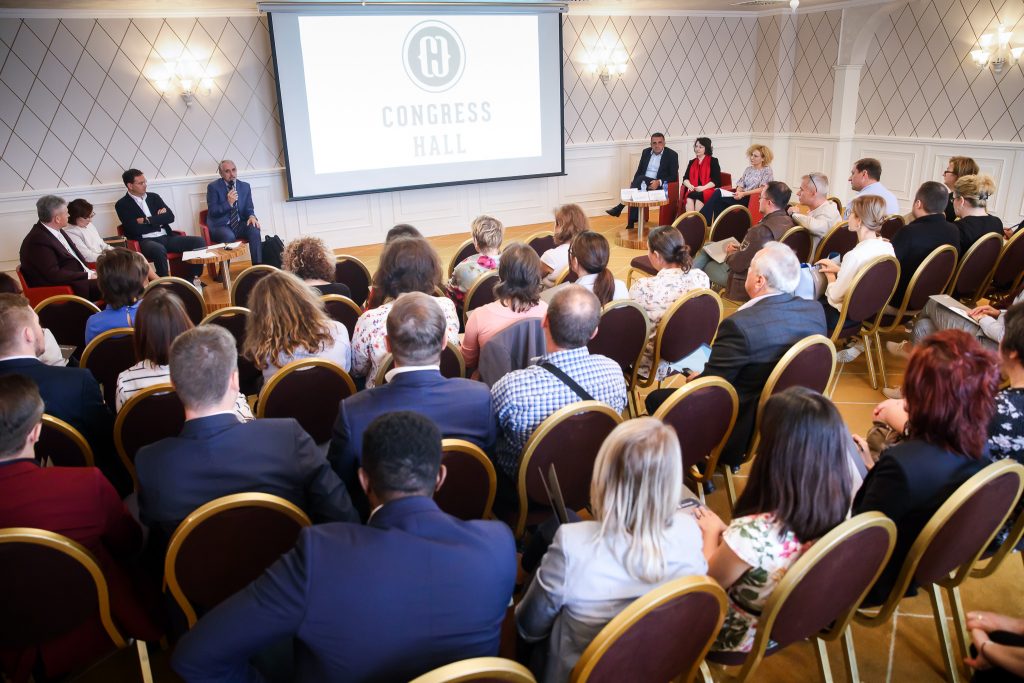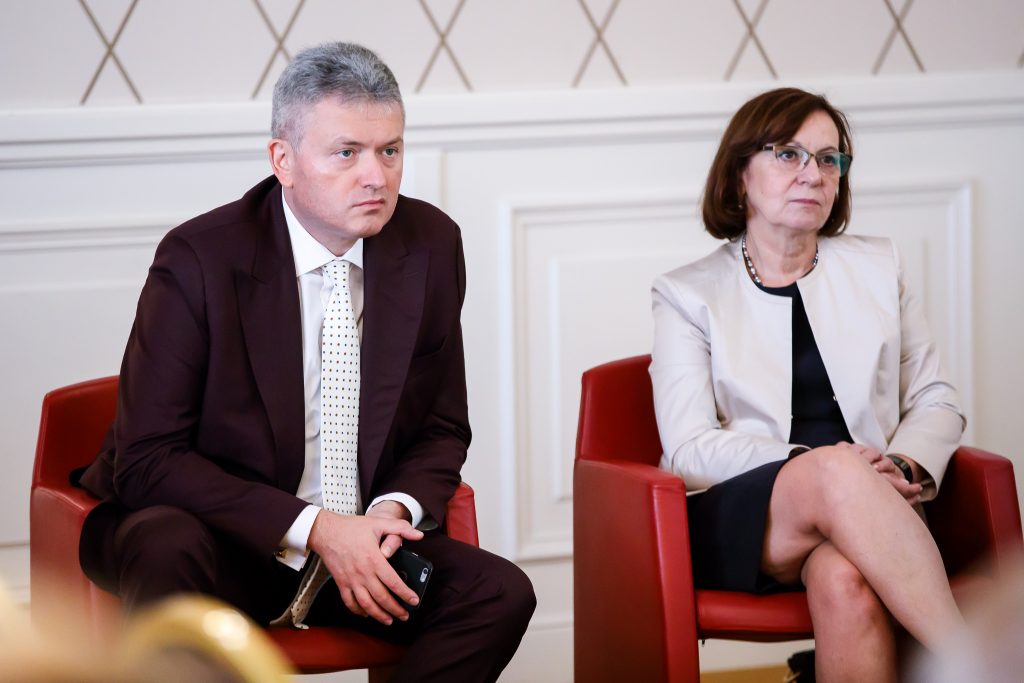LDDP, CERTIC and Soter & Partners specialists addressed the issues raised by the practice of tax law during the conference
Synthesis:
On Friday, September 14, 2018, in the Mozart Hall of Palas Mall Iași, oppened the First Edition of the Conference “Challenges and Solutions”, organized by the accounting and tax consulting company CERTIC, Leaua Law Firm, Damcali, Deaconu, Păunescu – LDDP and the Soter & Partners company, specialized on accounting, tax consulting and auditing. During the event, the challenges posed by the practice of tax law were addressed.
The event was attended by: Dr. Dan Manolescu, President of the Romanian Chamber of Tax Consultants, Partner Soter & Partners, conf. univ. dr. lawyer Crenguța Leaua – Managing Partner Leaua, Damcali, Deaconu, Păunescu – LDDP, prof. univ. dr. lawyer Radu Bufan from the Faculty of Law of the West University of Timișoara, Mrs. Mariana Vizoli, former General Director of the Tax Code Legislation and Customs Regulations Department and Secretary of State in the Ministry of Public Finance, currently tax consultant and member of the Chamber of Tax Consultants, lawyer Dr. Gheorghe Matei – Managing Partner Tax Department Leaua, Damcali, Deaconu, Păunescu – LDDP, lawyer Dr. Mirela Buliga – Senior Associate Leaua, Damcali, Deaconu, Păunescu – LDDP and ec. Radu Constantin Iațco, CERTIC Manager.
Dan Manolescu, the president of the Chamber of Fiscal Consultants, presented the legislative trends in fiscal matters this autumn, the expectations of changes in the field of VAT, which already have political support, but also the discussions regarding the Ordinance 79.
“There are complaints from taxpayers about the excessive transposition of the ATAD Directive on the degree of interest deductibility, because our regulation has adopted the most restrictive conditions offered in the Directive and the business community has requested the correction of this situation,” said Dan Manolescu
The need to regulate the fiscal consolidation in Romania, with all its advantages, especially in view of the very burdensome tasks of the present regarding the preparation of the transfer pricing file and which ANAF would like to maintain, for internal transactions, even in the context of fiscal consolidation, was another topic addressed by Dan Manolescu.
“Although the preparation of this system is particularly laborious, sooner or later Romania will have to accept it, especially since at EU level significant progress is being made in finalizing the consolidated common tax base (CCCTB),” said Dan Manolescu.
Dan Manolescu also analyzed the extension of the micro-enterprise taxation system, showing that it “currently comprises over 80% of the total number of economic agents and which seems to be accepted by most small entrepreneurs, so that this system and that of the specific tax have become dominant in relation to the number of companies paying the profit tax ”. Dan Manolescu also presented the discussions regarding the application of IFRS 16 in the case of leases. “The new regulation, under debate at the Ministry of Public Finance, leads to the recognition in the financial statements of some intangible assets and not of the actual rent”, said Dan Manolescu.
Crengu’a Leaua – Managing Partner with LDDP, stressed the importance of drafting price clauses in international trade contracts from the perspective of taxes and fees, taking into account the tax obligations of the parties:
“If the price clause does not indicate to what extent taxes are included in it (VAT, customs duties, excise duties, etc.) and to what extent, disputes may arise. Disputes will also inevitably arise if the consequences of legislative changes regarding the tax aspects of the contract price are not clarified. International practice in international arbitration abounds in such cases, which the parties could avoid with a good wording of the contract.”

Crenguța Leaua drew attention to the existence of a legislation coordination gap between the tax regime and the common law regime in the case of the regime of separation of assets between spouses. “The amendment brought by the New Civil Code, which introduced the possibility of choosing between several matrimonial regimes, was not reflected in the tax legislation, which omits to take this fact into account, and does not take into account the situation of separation of assets, starting from the premise that all situations would be those of a community of goods. Logically, the two situations cannot be treated in the same way “, said Crenguța Leaua.
“European Union law is dynamic, the practice of the CJEU is part of EU law, so when the taxpayer notifies the CJEU, the decision to be given becomes binding on all Member States and their taxpayers. A taxpayer is not limited, in terms of the possibilities of defense he has, to national law and national courts, but has the possibility to invoke the provisions of EU law and to address the CJEU as well. As the decisions of the CJEU are a source of EU law, the taxpayer has the possibility to, by appealing to this court, to obtain decisions regarding the very content and interpretation of the legal norms from the internal legislation “, Crenguța Leaua underlined .
Prof. univ. Radu Bufan underlined the importance of exercising the means of appeal against the taxation decisions from the perspective of capitalizing on the reason for revision provided by art. 21 of the Law on Administrative Litigation.
“Since 2010 I have won in a request for review at the Timișoara Court of Appeal by invoking the supremacy of European law”, said prof. Univ. Dr. Radu Bufan.
Prof. Dr. Radu Bufan stated that “there is always a dose of risk in identifying the conditions provided by law for the VAT exemption of business transfer, even the jurisprudence of the Court of Justice of the European Union being insufficient in this regard.”

Prof. univ. Dr. Radu Bufan also presented the initiative to abandon the declaratory principle in the field of local taxes and fees, which would support the population.
“As all the data and information that citizens currently have to declare are already in the possession of various state authorities, buildings, land and vehicles can be taxed ex officio, without the need for declarations in this regard,” said Prof. Univ. . Dr. Radu Bufan.
Mariana Vizoli, currently a tax consultant, presented the new legislation on VAT but also the existing trends at European level that will lead to a substantial change in the rules on VAT.
“We have a fairly rich jurisprudence of the CJEU on the right to deduct VAT, there are decisions in which the CJEU has shown that, if the substantive conditions are met, the formal conditions are less important. The judgments of the CJEU are opposable erga omnes and our administrative legislator – the Ministry of Public Finance – has been concerned with illustrating the Methodological Rules for the application of the Fiscal Code with as many relevant decisions of the CJEU on excise and VAT as possible to ensure their knowledge and application. Romania “, said Mariana Vizoli.
Mariana Vizoli insisted on the draft directives that will enter into force by 2022, emphasizing the importance of the definitive VAT regime for intra-Community supplies, which requires taxation on departure with VAT in the quota of the Member State of destination, payment being made through the one-stop shop in the Member State where the supplier is established, followed by settlement between Member States.
“The importance of this regulation derives from the perspective of combating cross-border fraud due to the current transitional regime that has been applied for over 25 years in the EU, namely exemption of intra-Community supplies and payment by applying the reverse charge mechanism in intra-Community acquisition of goods,” said Mariana Vizoli.
Gheorghe Matei – Managing Partner Tax Department LDDP stated that “the approach of the fiscal body in the matter of reclassification of delegation / secondment allowances in salary income is lacking in purpose for employees. They cannot benefit from the social contributions established additionally by the fiscal body ”.
Gheorghe Matei presented the challenges of the tax inspection and the tax litigation. “The tax inspection always causes controversy in practice, there is no transparent procedure, generally applicable in the selection of taxpayers for the tax inspection”, Gheorghe Matei underlined.
“The criteria for establishing the risk analysis must be made public, each taxpayer must have the opportunity to comply voluntarily, to know the risks to which he is exposed”, Gheorghe Matei also pointed out.
Mirela Buliga – Senior Associate LDDP presented the challenges of Romanian economic agents operating abroad, the refusal to apply Law no. 209/2015 on the annulment of tax obligations stating that “in most cases the approach of the courts was to find the incidence of the amnesty law even in situations where the tax authority did not use the legal basis of Article 11 paragraph (1) Fiscal code for the requalification of the delegation / secondment allowances in taxable salary incomes and bearers of social contributions in Romania “.
“In the case of salary activities carried out abroad through the corroborated analysis of double taxation avoidance agreements and the provisions of the tax code, these incomes, even if they are reclassified by the tax authority in delegation / secondment allowances, should not be taxable in Romania, there is an express legal basis for non-taxation “, said Mirela Buliga.
Mirela Buliga stressed that in the case of salary activities carried out abroad “special attention must be paid to the economic employer, a concept of international tax law, distinct from the formal employer, not only in the case of staff leasing and which may lead to a different configuration of the rule. allocation of taxing power ‘.
Radu Iațco, CERTIC Manager underlined the difficulties of applying the CJEU jurisprudence regarding the anchor tenant, due to a conservative way of assessing certain situations.
“In our tax practice it has appeared very strange and difficult to accept the idea, consistent in international business practice, that a landlord must indemnify a tenant” anchor “because his reputation will attract other tenants in the building.” Radu Iațco pointed out.







